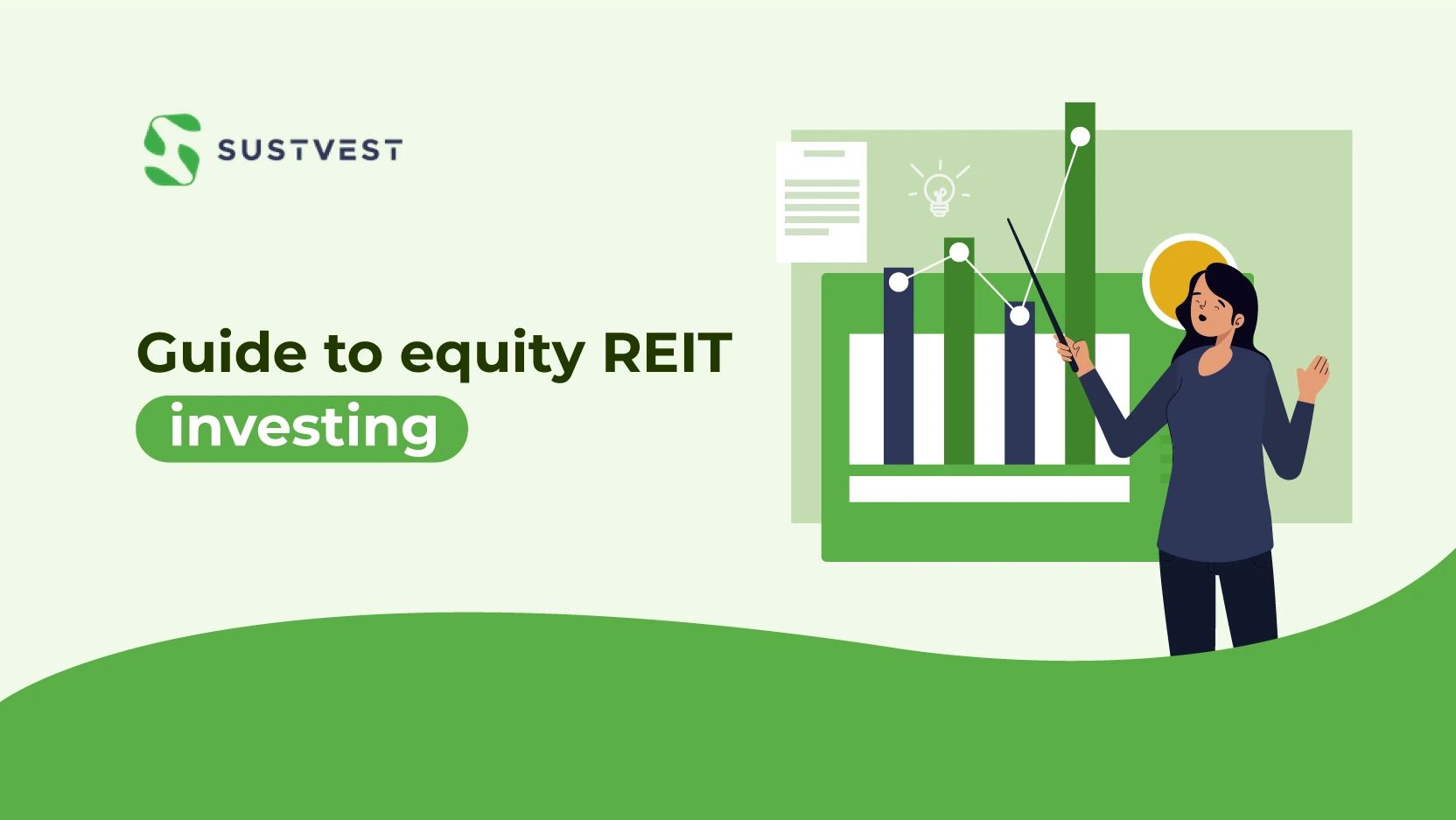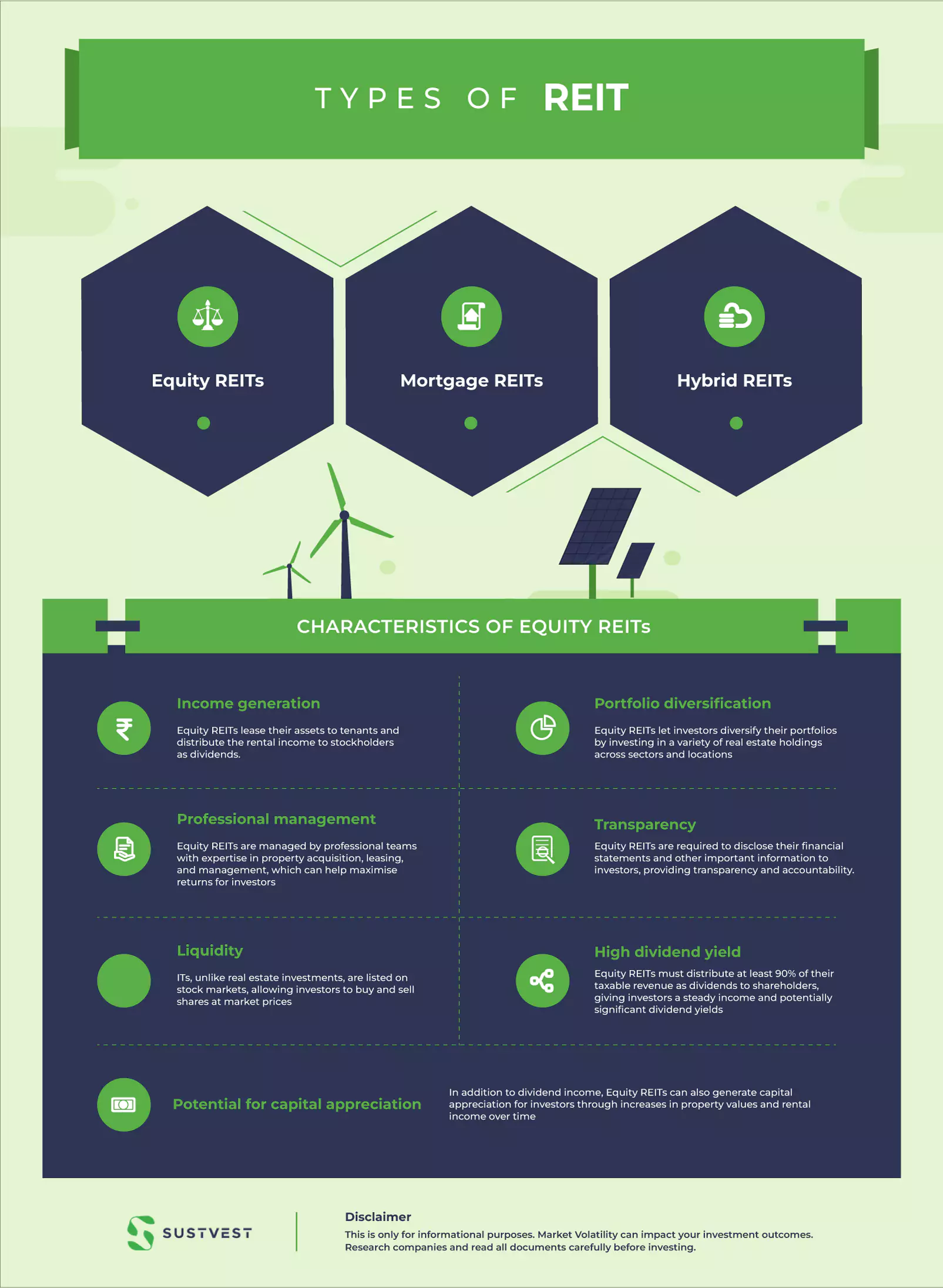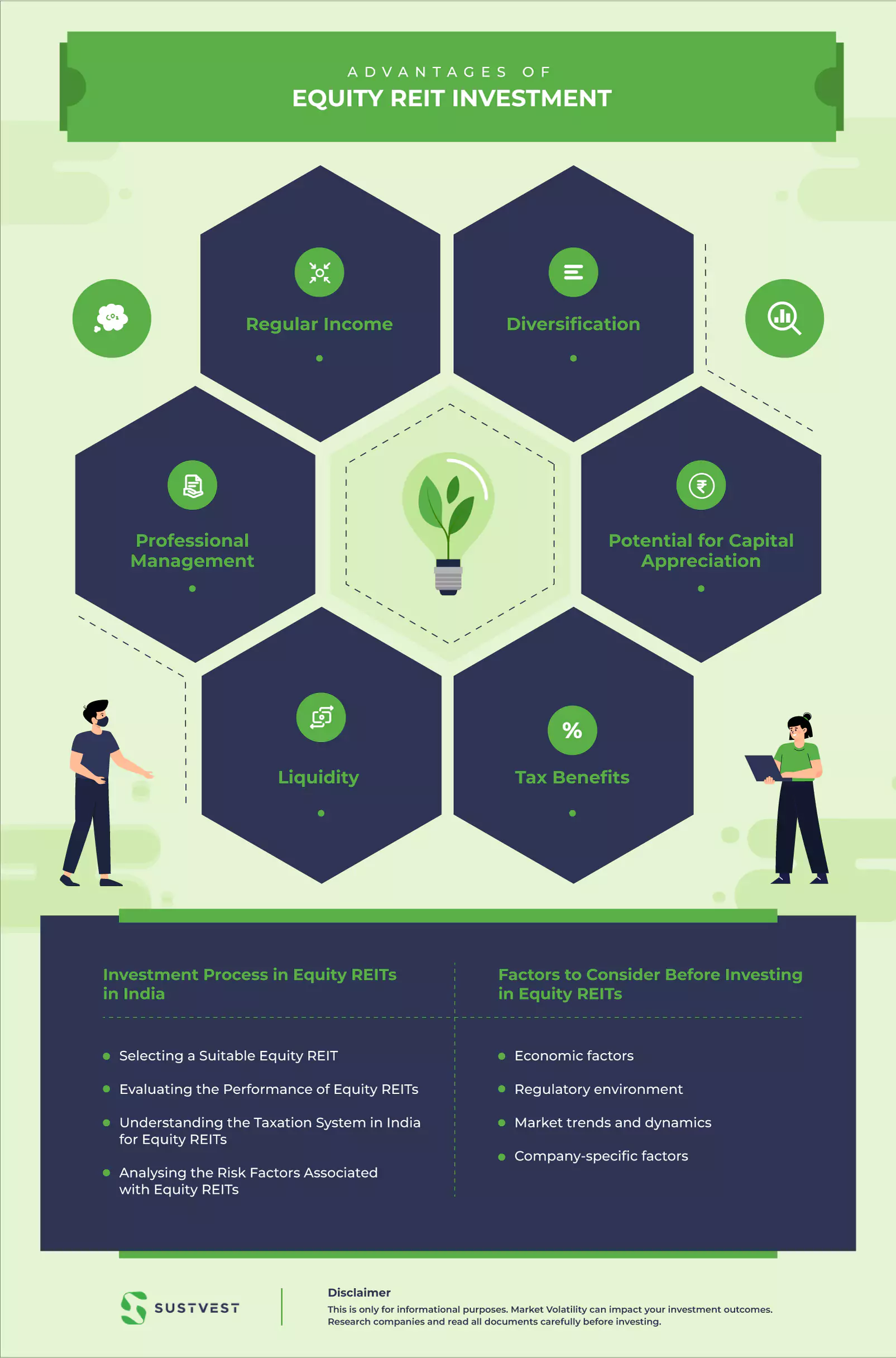Real Estate Investment Trust i.e., REIT investment, have become increasingly famous among buyers in the past few years as they can result in a steady income and an increase in revenue. Equity REITs are especially attractive to Indian real estate investors.
Equity REITs invest in office buildings, shopping malls, and apartment complexes and provide rental revenue to stockholders.
In this post, we will provide a thorough guide to Equity REIT investment in India, including the basics of REITs and their characteristics, the investment procedure, factors to consider before investing, and advice for investing.
This article is for both new and experienced investors who want to add Equity REITs to their investment portfolios in India.

What is REIT?
REIT stands for Real Estate Investment Trust or REIT Investment. It is a company that owns, operates, or finances income-generating real estate properties.
REITs collect funds from several investors and utilise them for purchasing a variety of properties, such as apartment complexes, shopping centres, hotels, office buildings, and industrial sites.
In return, investors receive regular dividends and the potential for long-term capital appreciation. REITs were created to give ordinary people a simple, transparent, and liquid option to put money into the real estate market.
It has also been noted that REITs are considered to be one of the best alternatives to mutual funds.
Types of REIT
In response to Where We Can Invest Money: Exploring Low, Medium, And High Risk Investment Options, a REIT can be a viable investment option, so knowing its type could benefit your investment journey.
In India, there are three types of REITs:
- Equity REITs
- Mortgage REITs
- Hybrid REITs.
Equity REITs
Equity REITs invest in commercial, office, retail, and residential buildings that generate income. These properties are leased out to tenants, generating rental income, which is distributed to the investors as dividends.
Equity REITs derive their income from rental income and capital appreciation of the underlying properties. They let people deal in real estate without having to buy and take care of properties themselves.
Mortgage REITs
Mortgage REITs invest in mortgage-backed securities and other real estate-backed debt instruments. These securities generate interest income, which is distributed to investors as dividends.
Mortgage REITs engage in real estate directly or indirectly, although interest income is their main source of revenue.
Hybrid REITs
Hybrid REITs are a combination of equity and mortgage REITs. They invest in income-generating properties and mortgage-backed securities.
Property revenue is combined with mortgage-backed securities and other debt instrument interest. The dividends distributed to investors are a combination of rental income and interest income.
It is important to note that in India, only Equity REITs are currently operational, and Mortgage and Hybrid REITs are yet to be introduced.
SEBI has proposed draft regulations for Mortgage REITs and Hybrid REITs, which are expected to be enacted in the future.
Characteristics of Equity REITs
Understanding the characteristics of Equity REITs is crucial for investors looking to invest in this sector.
Here are some of the key characteristics of Equity REITs:
- Income generation: Equity REITs lease their assets to tenants and distribute the rental income to stockholders as dividends.
- Portfolio diversification: Equity REITs let investors diversify their portfolios by investing in a variety of real estate holdings across sectors and locations.
- Professional management: Equity REITs are managed by professional teams with expertise in property acquisition, leasing, and management, which can help maximise returns for investors.
- Transparency: Equity REITs are required to disclose their financial statements and other important information to investors, providing transparency and accountability.
- Liquidity: ITs, unlike real estate investments, are listed on stock markets, allowing investors to buy and sell shares at market prices.
- High dividend yield: Equity REITs must distribute at least 90% of their taxable revenue as dividends to shareholders, giving investors a steady income and potentially significant dividend yields.
- Potential for capital appreciation: In addition to dividend income, Equity REITs can also generate capital appreciation for investors through increases in property values and rental income over time.

Advantages of Equity REIT Investment
Recently, REITs have been a popular investment choice for investors seeking real estate market exposure without buying property. Equity REITs are an attractive option among real estate investors due to the numerous advantages they offer.
Here are some advantages of investing in Equity REITs:
- Regular Income: Equity REITs generate income from rental payments, which are distributed to investors in the form of dividends. This regular income can provide a steady stream of cash flow for investors.
- Diversification: Equity REITs allow investors to diversify their portfolios beyond stocks and bonds. Investors can limit risk and volatility by investing in commercial, residential, and retail properties.
- Professional Management: Equity REITs are managed by experienced real estate professionals. This can give investors knowledge and experience they may not have.
- Liquidity: Equity REITs trade on stock exchanges, making them a more liquid investment option than physical real estate. Equity REITs can be bought and sold daily, giving investors more flexibility and access.
- Tax Benefits: Equity REITs offer tax benefits to investors. As a pass-through entity, REITs do not pay corporate income tax, which can result in higher dividends for investors. Additionally, investors can benefit from depreciation deductions, which can reduce their tax liability.
- Potential for Capital Appreciation: Equity REITs can appreciate in value over time, providing investors with capital gains when they sell their shares. The potential for capital appreciation is higher in Equity REITs investment in high-growth sectors such as logistics, data centres, and healthcare.
Investment Process in Equity REITs in India
- Selecting a Suitable Equity REIT
Choosing the right Equity REIT that fits your investment objectives is essential when investing in India. Consider the investment strategy, sector focus, and track record of the Equity REIT before investing.
It is recommended to conduct thorough research and analysis of the Equity REITs’ financial statements, property portfolio, and management team.
As an investor, you can also invest in real estate sustainably. One such example is investing in renewable energy infrastructure through REITs.
By investing in renewable energy infrastructure REITs, you can contribute to sustainable development and earn steady returns on your investment.
Sustvest is an example of such a renewable investment platform that offers investment opportunities in renewable energy infrastructure REITs in India.
- Evaluating the Performance of Equity REITs
To evaluate the performance of Equity REITs, investors can assess the following metrics:
- Funds From Operations (FFO) and Adjusted Funds From Operations (AFFO): FFO is a measure of the cash generated by the REIT’s operations, while AFFO is a measure of FFO adjusted for capital expenditures.
- Net Asset Value (NAV) per share: NAV per share is calculated by dividing the total net asset value of the REIT by the number of outstanding shares.
- Dividend Yield: Dividend yield is calculated by dividing the annual dividends paid by the REIT by the current share price.
- Understanding the Taxation System in India for Equity REITs
Taxes on rental income and capital gains are exempted for Equity REITs in India under rules established by the Securities and Exchange Board of India (SEBI).
However, investors need to pay taxes on their dividend income and capital gains from the sale of Equity REIT units. The tax rate on dividend income and capital gains depends on the investor’s tax bracket.
- Analysing the Risk Factors Associated with Equity REITs
Like any investment, Equity REITs carry some risk factors that investors should be aware of. These risk factors include the following:
- Market risk
- Interest rate risk
- Liquidity risk
- Credit risk
It is crucial to analyse these risk factors and assess how they may affect the Equity REITs performance before investing.
As mentioned earlier, sustainable investment opportunities in the real estate sector offer a unique risk-return profile.
For example, investments in renewable energy infrastructure REITs can provide stable cash flows and reduced exposure to market volatility.
Sustvest offers a platform that enables investors to diversify their portfolios with sustainable investment opportunities in the real estate sector.
Factors to Consider Before Investing in Equity REITs
In India, Equity REITs investment is a growing option, providing investors with a chance to earn stable returns through rental income and capital appreciation. However, there are many factors investors should consider before investing in Equity REITs.
- Economic factors
Economic conditions affect real estate performance. High GDP growth, low inflation, and low-interest rates can improve real estate rental returns and capital appreciation.
However, an economic slowdown can hurt real estate, lowering rental returns and capital depreciation. Investors should carefully evaluate the current economic conditions before investing in Equity REITs.
- Regulatory environment
The Real Estate Investment Trusts Regulations, 2014, have changed equity REIT regulation in India.
The regulations provide a framework for the operation of Equity REITs in India, including restrictions on investments, borrowing limits, and distribution of dividends.
Investors should ensure that the Equity REIT they are investing in complies with all the regulatory requirements.
- Market trends and dynamics
Market variables, including demographic shifts, urbanisation, and consumer preferences, affect the real estate business.
Investors should analyse the current market trends, including demand and supply dynamics, to evaluate the potential of Equity REITs.
Additionally, investors should consider the location and quality of the properties owned by Equity REIT, as these factors can impact rental yields and capital appreciation.
- Company-specific factors
Investors should evaluate the financial performance and management quality of the Equity REIT they are considering investing in.
This includes analysing the track record of the management team, the quality of the properties owned by the Equity REIT, and the rental yields and occupancy rates of these properties.
Additionally, investors should consider the debt levels and liquidity position of the Equity REIT, as these factors can impact the stability of the returns.

FAQs: Guide to Equity REIT Investment in India
What is equity REIT investment?
Equity REITs refer to real estate firms that possess or oversee properties that generate income, including office buildings, shopping centers, and apartments. These companies rent out the space to tenants and, once operational expenses are covered, distribute the majority of their earnings as dividends to shareholders on an annual basis. Additionally, equity REITs derive income through property sales.
Can individuals make equity REIT investment?
Yes, individuals can invest in Equity REITs through the purchase of shares on stock exchanges. They can buy shares directly or invest in REIT mutual funds or exchange-traded funds (ETFs) that hold a portfolio of REIT stocks.
Conclusion
Equity REITs Investment in India helps diversify a portfolio and profit from the real estate market’s growth. Market trends, economic considerations, and company-specific details can help investors make informed decisions and earn long-term returns.
Today, investing in renewable energy is a responsible and financially good choice. As the need for sustainable solutions becomes increasingly pressing, renewable energy investments can offer both financial and environmental benefits.
SustVest is an investment platform that allows investors to support renewable energy projects and make a positive impact on the planet while achieving their financial goals.
By promoting and utilising such sustainable investment options, investors can contribute to a greener future while also achieving their financial objectives.
The Complete Guide to REIT Investment in India: Pros, Cons, and Investment Potential can provide you with more information about REITs.

Founder of Sustvest
Hardik completed his B.Tech from BITS Pilani. Keeping the current global scenario, the growth of renewable energy in mind, and people looking for investment opportunities in mind he founded SustVest ( formerly, Solar Grid X ) in 2018. This venture led him to achieve the ‘Emerging Fintech Talent of the Year in MENA region ‘ in October 2019.




